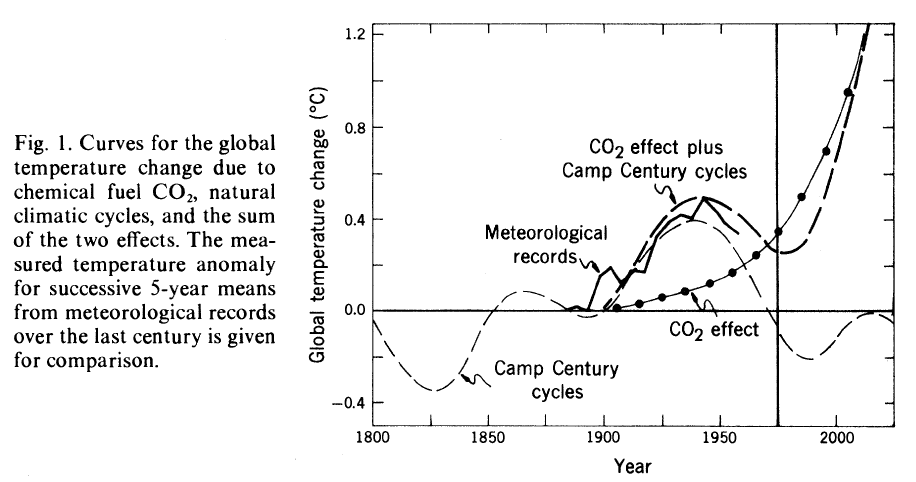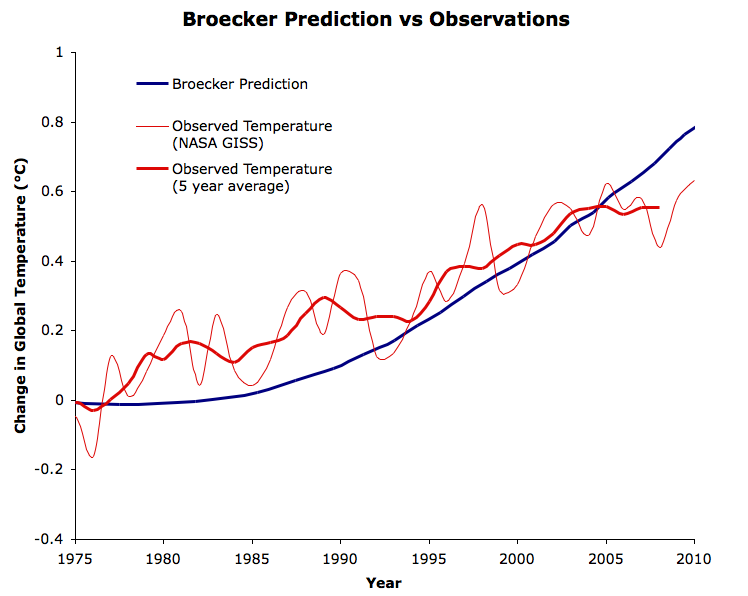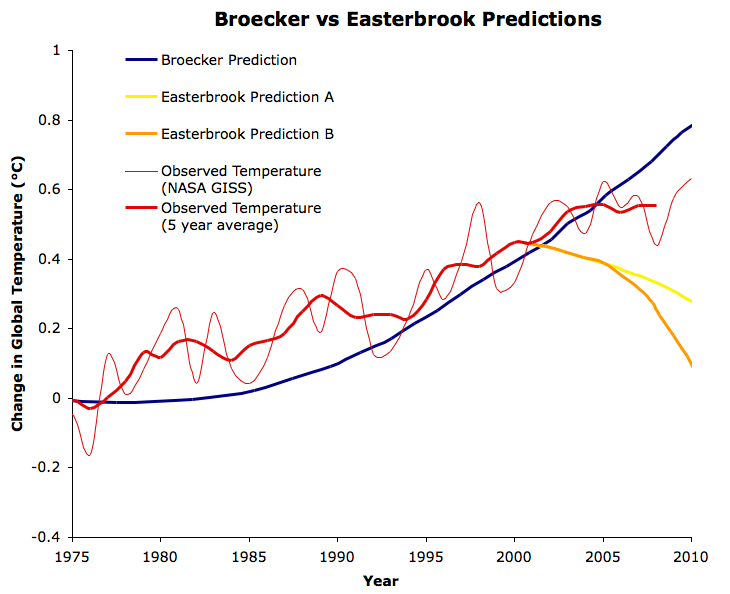Lessons from Past Climate Predictions: Wallace Broecker
Posted on 18 July 2011 by dana1981
 Wallace Broecker was among the first climate scientists to use simple climate models to predict future global temperature changes. His 1975 paper Climatic Change: Are We on the Brink of a Pronounced Global Warming? is widely credited with coining the term "global warming".
Wallace Broecker was among the first climate scientists to use simple climate models to predict future global temperature changes. His 1975 paper Climatic Change: Are We on the Brink of a Pronounced Global Warming? is widely credited with coining the term "global warming".
In that paper, Broecker modeled the effects of the expected future increase of CO2 due to humans burning fossil fuels, combined with a natural climate cycle which he estimated based on Greenland ice core records, and tweaked to match the observed temperature record at the time (Figure 1).
Figure 1: Broecker's global temperature prediction
This was a very simple model, excluding the effects of the sun, volcanoes, other greenhouse gases, aerosols, and so forth, which Broecker acknowledged:
"In this report only the interaction of the CO2 effect and natural climatic change is considered. As other anthropogenic effects are shown to be significant and as means to quantitatively predict their future influence on global temperatures are developed, they can be included in models such as this."
As it turns out, Broecker has been fortunate, because the cooling effects of human aerosol emissions have roughly cancelled out the warming effects of human non-CO2 greenhouse gas emissions since 1975, and solar activity has been flat over that period. So the net effect of the factors which he did not take into account has been close to zero. However, Broecker was also smart; the dominant effect on temperature since 1975 has been from CO2, as he expected. It's better to be lucky than good, but it's best to be both.
Broecker anticipated the actual increase in CO2 very closely, predicting 373 ppm in 2000 and 403 ppm in 2010 (actual values were 369 and 390 ppm, respectively). Broecker also used an equilibrium climate sensitivity of 3°C for doubled CO2; however, his model's transient climate sensitivity worked out to be 2.4°C for doubled CO2. Current climate models put equilibrium sensitivty at 1.5 times transient sensitivty, so Broecker effectively underestimated the thermal lag of the climate system, and the equilibrium sensitivity in his calculations was approximately equivalent to 3.6°C for doubled CO2 - a bit higher than today's best estimates of 2°C transient sensitivity, 3°C equilibrium sensitivity.
We digitized Broecker's prediction from Figure 1, and compared it to the observed global temperature change since 1975 (Figure 2). We adjusted it slightly to reflect the current atmosperic CO2 concentration (390 ppm) as opposed to his predicted 403 ppm, because we're interested in the accuracy of Broecker's temperature predictions, not his CO2 predictions.
Figure 2: Broecker's temperature prediction, adjusted to reflect measured CO2 changes, vs. GISTemp observed global surface temperature changes.
As you can see, Broecker's prediction has matched the net global temperature change quite closely over the past 35 years. His 'natural cycle' estimate held his prediction below the actual global temperature increase for most of the period, but as illustrated in Figure 1, he predicted its effects would approach zero after 2000. Not coincidentally, this is when his prediction most closely matches the observed global temperature. Broecker overestimated the amount of global warming by 2010 slightly, by a bit less than 0.2°C. This is probably mainly due to his slight overestimate of climate sensitivity, and potentially due to the increased cooling effects over the past decade.
It's quite remarkable that a prediction made in 1975 using such a simple model of the climate system could so accurately match the observed global temperature change. It's a testament to the dominant effect of CO2, and the fact that we have had a solid understanding of the fundamental workings of the Earth's climate for many decades.
Nevertheless, those who are "skeptical" that humans are driving global warming, including the few climate scientists in this category, often emphasize and exaggerate what we don't know about how the Earth's climate functions. In his testimony before US Congress earlier this year, "skeptic" climate scientist John Christy compared the state of climate science research in the 1970s to that today, saying "our ignorance about the climate system is just enormous".
While it's true that there remain some features of the climate system which we still don't fully understand, Broecker's success illustrates that climate scientists have long had a good grasp on the main drivers of the global climate.
While the "skeptics" enjoy criticizing climate scientists, they rarely put their money where their mouths are in terms of making predictions of their own. We previously examined one of the exceptions - Don Easterbrook, who has been predicting imminent global cooling since approximately 2000. He stood by that prediction in December 2008, presenting his projections of future global temperature change at the American Geophysical Union annual conference. Easterbrook's model is even simpler than Broecker's, only taking into account his estimates of past natural climate cycles, assuming they will continue in the future, and effectively presuming that CO2 has no effect on global temperatures (throwing out the centuries-old physics of Tyndall and Arrhenius). Figure 3 compares Broecker's prediction and two of Easterbrook's to the observed global temperature.
Broecker's 1975 prediction was within 0.2°C of the observed global temperature in 2010, while Easterbrook's, last made in December 2008, were off by 0.3 to 0.5°C. This illustrates the importance of basing future predictions on solid physical footing, and also shows that climate scientists understand the inner workings of the global climate much better than the "skeptics" would have us believe. In fact, in the 1970s, climate scientists understood how the Earth's climate works better than many "skeptic" scientists do in 2011!































 Arguments
Arguments

































Please check if you could update the correct URL for the "missing link" to the paper, in the first sentence:
... to predict future global temperature changes. His 1975 paper Climatic Change: Are We on the Brink of a Pronounced Global Warming? is widely credited with coining the term "global warming". ...
[PS] Thanks for that heads up. In meantime try this link.